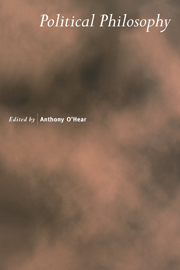Book contents
- Frontmatter
- Contents
- Preface
- Notes on Contributors
- Making the World Safe for Utilitarianism
- Innocent Before God: Politics, Morality and the Case of Billy Budd
- Democracy and Openness
- Rights and Human Rights
- Prerogative to Depart from Equality
- Casting the First Stone: Who Can, and Who Can't, Condemn the Terrorists?
- Against Egalitarianism
- Big Decision: Opting, Converting, Drifing
- The Epistemology of Unjust War
- High Culture, Low Politics
- Edmund Burke and the Anglo-American Tradition of Liberty
- The Politics of Emotion: Liberalism and Cognitivism
- Index of Names
Making the World Safe for Utilitarianism
Published online by Cambridge University Press: 04 August 2010
- Frontmatter
- Contents
- Preface
- Notes on Contributors
- Making the World Safe for Utilitarianism
- Innocent Before God: Politics, Morality and the Case of Billy Budd
- Democracy and Openness
- Rights and Human Rights
- Prerogative to Depart from Equality
- Casting the First Stone: Who Can, and Who Can't, Condemn the Terrorists?
- Against Egalitarianism
- Big Decision: Opting, Converting, Drifing
- The Epistemology of Unjust War
- High Culture, Low Politics
- Edmund Burke and the Anglo-American Tradition of Liberty
- The Politics of Emotion: Liberalism and Cognitivism
- Index of Names
Summary
Introduction
Utilitarianism has a curious history. Its most celebrated founders—Jeremy Bentham and John Stuart Mill—were radical progressives, straddling the worlds of academic philosophy, political science, economic theory and practical affairs. They made innumerable recommendations for legal, social, political and economic reform, often (especially in Bentham's case) described in fine detail. Some of these recommendations were followed, sooner or later, and many of their radical ideas have become close to articles of faith of western liberalism. Furthermore many of these recommendations were made expressly to improve the condition of the deprived, or of oppressed groups. Yet the moral theory which inspired this reforming zeal is, at least officially, utilitarianism, and when we teach this theory to our students we feel it our duty to point out the horrors that could be justified by any theory which assesses the moral quality of actions in terms of the maximization of good consequences over bad. No consequence is so bad that it cannot, in principle, be outweighed by a large aggregation of smaller goods. Hence there are circumstances in which utilitarianism can require slavery, the punishment of the innocent, and redistribution of resources from the poor to the rich, or from the disabled and the sick to the able bodied and healthy. Indeed, in the right circumstances, it can justify pretty much anything you can think of. For all their intelligence and imagination neither Bentham nor Mill seemed to recognise or discuss these catastrophic possibilities.
- Type
- Chapter
- Information
- Political Philosophy , pp. 1 - 22Publisher: Cambridge University PressPrint publication year: 2007
- 3
- Cited by



